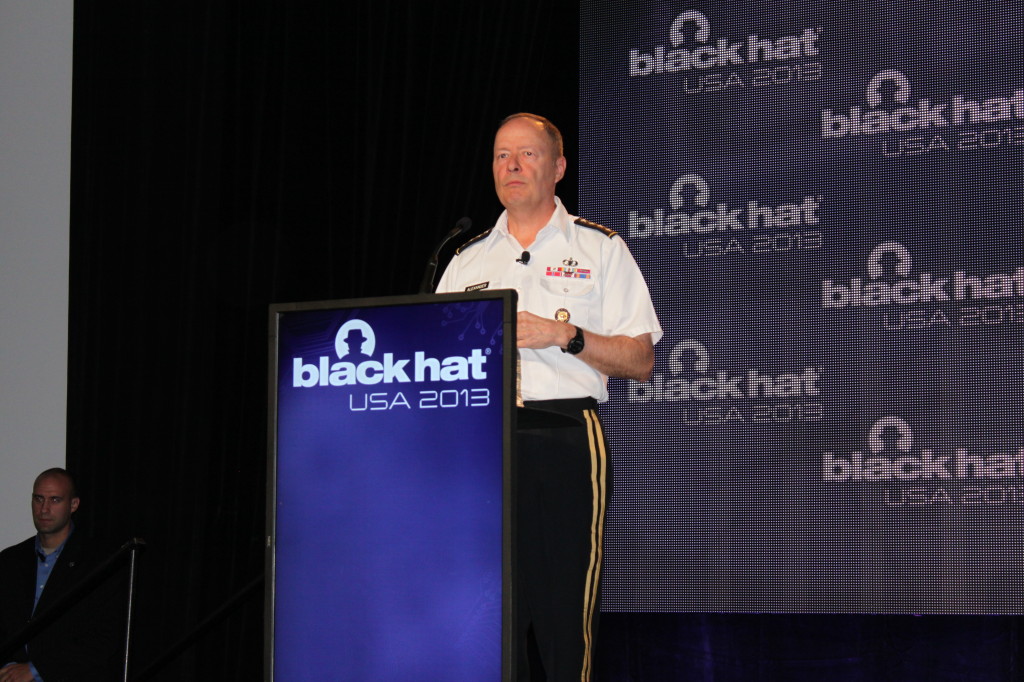The head of the U.S. Cyber Command, Four-Star General Keith Alexander, told an audience of skeptical and sometimes hostile security experts and hackers that they should have faith that the U.S. National Security Agency (NSA) isn’t abusing its access to cell phone meta data and other online communications in its pursuit of terrorists who “live among us.” Speaking before a packed audience that included some of the country’s top computer security and privacy experts, Alexander spoke in measured tones about PRISM, the omnibus data collection program that was exposed in documents leaked by a former Booz Allen Hamilton contractor, Edward Snowden, saying that it had directly led to the disruption of 53 of 54 discrete “terrorist related activities” in the U.S., Europe, Asia and Africa since the September 11, 2001 terrorist attacks on New York and Washington, D.C. Adopting images and a tone common in the years immediately following 9/11, […]
point of sale
Welcoming A New Sponsor: Gemalto
Just a note to my loyal readers that The Security Ledger is welcoming a new sponsor this week: Gemalto. If you’re not familiar with them, Gemalto NV (GTO) is a ~3B firm that makes a wide range of software for e-identity documents, chip payment cards, network authentication devices and wireless modules, as well as the software to manage confidential data and secure transactions in the telecommunications, financial services, e-government, and information technology security markets. This is an especially exciting win for The Security Ledger because Gemalto, with 10,000 employees and offices in 46 countries is a key supplier to the global Internet of Things. Products like its Protiva platform provide the foundation of trust that undergirds online person-to-machine and machine-to-machine transactions and exchanges of all kinds: on mobile devices, smart cards, medical devices, automobiles and more. We’re really excited to have Gemalto on board as a Security Ledger sponsor. Please join […]
Missing in Action At BlackHat: The PC
Once the target of choice for hackers of all stripes, personal computers (PC) will be -at most- a side attraction at this year’s annual Black Hat Briefings show in Las Vegas, where presentations on ways to attack mobile devices and other networked “stuff” will take center stage. Just over ten percent of the scheduled talks and turbo talks at The Black Hat Briefings in early August (5 of 47) will be devoted to attacks against what might be considered “traditional” endpoints, like end user systems and servers running Microsoft’s Windows, Apple’s Mac OSX and Linux. By contrast, more than 30% will discuss security flaws and attacks against mobile phones or other “smart” devices including wireless surveillance cameras, home automation systems and smart meters. The dearth of PC-focused talks isn’t a new trend in and of itself. As far back as 2006, talks that explicitly discussed security issues with components of Microsoft’s […]
Podcast: The Big Truth – Responding To Sophisticated Attacks
If you work at a rank and file corporation in the U.S. or Europe, stories like those about the breach at the defense contractor Qinetiq are terrifying. Here’s a company that’s on the bleeding edge of technology, making autonomous vehicles and other high-tech gadgetry for the U.S. Military. Despite that, it finds itself the hapless victim of a devastating cyber breach that lasts – by all accounts – for months, or years. In the end, the attackers (likely linked to China’s People’s Liberation Army) make off with the company’s intellectual property (likely all of it) and, soon, defense contractors in Mainland China start turning out devices that look eerily similar to the ones Qinetiq makes. Ouch! If a company like Qinetiq can’t stop an attack by advanced persistent threats (APT) – or whatever name you want to use – what hope do overworked IT admins at rank and file enterprises […]
Tantalizing Clues in Dexter Malware Lead to Mystery Man…and Zeus
The Dexter malware is getting some media attention this week – and not just because the malware shares its name with Showtime’s popular drama about a serial killer by the same name. (Not that those of us tasked to write catchy headlines don’t love stuff like that – ’cause we do.) No, the Dexter virus caught the attention of malware analysts because it infects point of sale (POS) systems like electronic cash registers, kiosks and automatic teller machines (ATMs), rather than run of the mill laptops and desktops. It has also generated some interest because it uses a form of memory dump parsing to steal sensitive data from infected POS terminals, and because its POS malware that is part of a botnet – communicating back to a command and control system and receiving commands – that’s quite unusual and, while its kind of insider baseball for malware geeks, it makes […]



